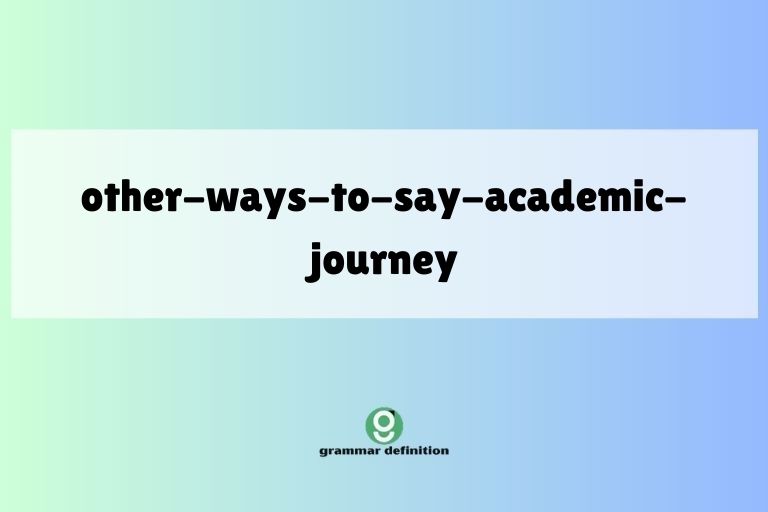Beyond the Books: Diverse Ways to Say “Academic Journey”

The phrase “academic journey” is a common and useful way to describe the path of learning and growth one undertakes in an educational setting. However, relying solely on this phrase can make your writing sound repetitive or lack nuance.
Expanding your vocabulary to include alternative expressions not only enhances your writing style but also allows you to convey subtle differences in meaning and emphasis. This article explores a wide range of synonyms and related phrases for “academic journey,” providing examples and practical guidance to help you choose the most appropriate expression for any given context.
Whether you are a student, educator, or simply someone interested in improving your communication skills, this guide will equip you with the tools to articulate the academic experience with greater precision and creativity.
Understanding and utilizing these alternative phrases is crucial for crafting compelling essays, delivering engaging presentations, and participating effectively in academic discussions. By mastering a diverse vocabulary, you can better express the complexities and nuances of the educational experience, making your communication more impactful and memorable.
Table of Contents
- Introduction
- Definition of “Academic Journey”
- Structural Breakdown of Alternative Phrases
- Types and Categories of Alternative Phrases
- Examples of Alternative Phrases
- Usage Rules and Guidelines
- Common Mistakes to Avoid
- Practice Exercises
- Advanced Topics
- Frequently Asked Questions (FAQ)
- Conclusion
Definition of “Academic Journey”
The term “academic journey” refers to the complete experience of a student or scholar as they progress through their education. It encompasses not only the formal aspects of schooling, such as coursework and exams, but also the informal learning, personal growth, and challenges encountered along the way.
It suggests a continuous process of discovery, development, and transformation.
Classification: The phrase “academic journey” is a noun phrase, typically functioning as the subject or object of a sentence. It often carries a positive connotation, emphasizing the transformative and enriching aspects of education.
Function: It serves to encapsulate the entire educational experience, highlighting its dynamic and evolving nature. It can be used to describe a specific period of study, an entire academic career, or the lifelong pursuit of knowledge.
Contexts: The phrase is commonly used in academic writing, personal essays, speeches, and informal conversations about education. It is suitable for both formal and informal settings, although more formal alternatives may be preferred in certain contexts.
Structural Breakdown of Alternative Phrases
Understanding the structure of alternative phrases can help you create your own variations and tailor your language to specific contexts. Many alternatives follow common patterns, such as:
- Noun + of + Noun: e.g., Path of learning, course of study, field of expertise.
- Adjective + Noun: e.g., Scholarly pursuit, intellectual endeavor, educational experience.
- Gerund + Noun: e.g., Learning process, studying career, researching field.
- Metaphorical Expressions: e.g., Voyage of discovery, quest for knowledge, climb to success.
By combining different elements and structures, you can create a wide variety of phrases that capture the essence of the “academic journey” in unique and compelling ways. For example, instead of “academic journey,” you might use “the long and winding road of higher education,” or “a continuous cycle of learning and growth.”
Types and Categories of Alternative Phrases
Alternative phrases for “academic journey” can be categorized based on their formality, tone, and specific focus. Understanding these categories can help you choose the most appropriate phrase for your intended audience and purpose.
Formal Alternatives
Formal alternatives are suitable for academic writing, presentations, and official communications. They tend to be more precise and objective, avoiding colloquialisms or overly figurative language.
These alternatives often emphasize the intellectual and scholarly aspects of the educational experience.
Examples of formal alternatives include: scholarly pursuit, intellectual endeavor, course of study, academic career, educational path, field of expertise, area of specialization, research trajectory, postgraduate studies, doctoral research.
Informal Alternatives
Informal alternatives are appropriate for casual conversations, personal essays, and situations where a more relaxed and approachable tone is desired. They often use simpler language and may incorporate colloquialisms or figurative expressions.
These alternatives highlight the personal and experiential aspects of the educational journey.
Examples of informal alternatives include: learning experience, educational adventure, school days, college life, the road to graduation, the climb to the top, the pursuit of knowledge, my studies, my education, the university years.
Metaphorical Alternatives
Metaphorical alternatives use figurative language to create vivid and evocative descriptions of the academic journey. They often employ metaphors, similes, and other literary devices to convey the challenges, rewards, and transformative power of education.
These alternatives can be particularly effective in personal essays, speeches, and creative writing.
Examples of metaphorical alternatives include: voyage of discovery, quest for knowledge, intellectual odyssey, climb to success, journey of transformation, path to enlightenment, exploration of the mind, the unfolding of potential, the blossoming of intellect, the pursuit of wisdom.
Specific Focus Alternatives
Specific focus alternatives emphasize particular aspects of the academic journey, such as the challenges, the rewards, or the personal growth experienced along the way. These alternatives allow you to tailor your language to the specific message you want to convey.
Examples of specific focus alternatives include: the challenges of higher education, the rewards of lifelong learning, the path to personal growth, the development of critical thinking skills, the acquisition of knowledge, the pursuit of excellence, the cultivation of intellectual curiosity, the journey of self-discovery, the process of intellectual maturation, the evolution of academic thought.
Examples of Alternative Phrases
Here are several tables with examples of different alternative phrases for “academic journey,” categorized for clarity and ease of reference.
Path of Learning
This table presents examples using “path of learning” and similar phrases to illustrate the concept of an academic journey.
| Example Sentence | Context |
|---|---|
| Her path of learning led her from a small rural school to a prestigious university. | Describing a student’s educational progression. |
| The path of learning is not always easy, but it is always rewarding. | General statement about the challenges and benefits of education. |
| He embarked on a new path of learning when he decided to study abroad. | Referring to a specific educational experience. |
| The path of learning requires dedication, perseverance, and a willingness to embrace new ideas. | Highlighting the necessary qualities for academic success. |
| Throughout her path of learning, she discovered a passion for scientific research. | Describing the development of a student’s interests. |
| The path of learning can be a transformative experience, shaping individuals and their perspectives. | Emphasizing the impact of education on personal growth. |
| He chose a challenging path of learning, focusing on both theoretical knowledge and practical application. | Describing a student’s approach to their studies. |
| The path of learning is a lifelong journey, extending far beyond the confines of formal education. | Highlighting the importance of continuous learning. |
| She navigated the path of learning with grace and determination, overcoming numerous obstacles along the way. | Describing a student’s resilience and perseverance. |
| The path of learning is paved with challenges, but the rewards are immeasurable. | Balancing the difficulties and benefits of education. |
| He encourages his students to embrace the path of learning with enthusiasm and curiosity. | A teacher’s advice to students. |
| The path of learning is a journey of self-discovery and intellectual growth. | Emphasizing the personal and intellectual benefits of education. |
| She found her true calling on the path of learning, dedicating her life to research and teaching. | Describing a career path shaped by education. |
| The path of learning is a continuous process of adaptation and innovation. | Highlighting the dynamic nature of education. |
| He believes that the path of learning should be accessible to everyone, regardless of their background or circumstances. | Advocating for equal educational opportunities. |
| The path of learning is not always linear; it often involves twists, turns, and unexpected detours. | Acknowledging the unpredictable nature of education. |
| She approached the path of learning with a sense of adventure, eager to explore new subjects and ideas. | Describing a student’s enthusiasm for learning. |
| The path of learning is a journey of collaboration and shared knowledge. | Emphasizing the importance of teamwork and community in education. |
| He found guidance and inspiration from mentors along his path of learning. | Highlighting the role of mentors in shaping a student’s education. |
| The path of learning is a testament to the human capacity for growth and transformation. | Celebrating the power of education to change lives. |
| Her path of learning was marked by both triumphs and setbacks, each contributing to her overall development. | Acknowledging the ups and downs of an academic journey. |
| The path of learning is a gateway to new opportunities and possibilities. | Emphasizing the potential that education unlocks. |
| He views the path of learning as a continuous process of self-improvement and intellectual refinement. | Describing a personal philosophy of education. |
| The path of learning is a journey of exploration, discovery, and endless possibilities. | Highlighting the exciting and boundless nature of education. |
Educational Pursuit
This table provides examples using “educational pursuit” and similar phrases to depict the academic journey as a focused and determined effort.
| Example Sentence | Context |
|---|---|
| Her educational pursuit was driven by a deep desire to make a difference in the world. | Describing the motivation behind a student’s education. |
| The educational pursuit requires a significant investment of time, energy, and resources. | Highlighting the commitment required for academic success. |
| He interrupted his educational pursuit to serve in the military, but he always intended to return to his studies. | Referring to a temporary break in education. |
| The educational pursuit is a challenging but ultimately rewarding endeavor. | Balancing the difficulties and benefits of education. |
| She dedicated her life to the educational pursuit, becoming a renowned scholar and teacher. | Describing a career path centered on education. |
| The educational pursuit is a journey of self-discovery and intellectual growth. | Emphasizing the personal and intellectual benefits of education. |
| He views the educational pursuit as a means of achieving his personal and professional goals. | Describing the purpose of education. |
| The educational pursuit is a lifelong process, extending far beyond the confines of formal schooling. | Highlighting the importance of continuous learning. |
| She approached her educational pursuit with a sense of passion and determination. | Describing a student’s enthusiasm and commitment. |
| The educational pursuit is a testament to the human desire for knowledge and understanding. | Celebrating the pursuit of learning. |
| He believes that the educational pursuit should be accessible to everyone, regardless of their background or socioeconomic status. | Advocating for equal educational opportunities. |
| The educational pursuit is not always easy, but it is always worthwhile. | Acknowledging the challenges and rewards of education. |
| She found solace and inspiration in her educational pursuit, especially during difficult times. | Describing the emotional benefits of education. |
| The educational pursuit is a shared responsibility, involving students, teachers, and the community as a whole. | Highlighting the collaborative nature of education. |
| He encourages his students to embrace the educational pursuit with curiosity and a thirst for knowledge. | A teacher’s advice to students. |
| The educational pursuit is a journey of constant learning, adaptation, and growth. | Emphasizing the dynamic nature of education. |
| She views the educational pursuit as a means of empowering individuals and transforming societies. | Describing the broader impact of education. |
| The educational pursuit is a pathway to new opportunities and possibilities. | Highlighting the potential that education unlocks. |
| He approached his educational pursuit with a strategic mindset, carefully planning his courses and career goals. | Describing a student’s approach to their studies. |
| The educational pursuit is a continuous process of self-improvement and intellectual refinement. | Describing a personal philosophy of education. |
| Her educational pursuit was marked by both successes and failures, each contributing to her overall development. | Acknowledging the ups and downs of an academic journey. |
| The educational pursuit is a gateway to a world of knowledge, understanding, and endless possibilities. | Highlighting the exciting and boundless nature of education. |
| He found mentorship and guidance from experienced scholars during his educational pursuit. | Highlighting the role of mentors in shaping a student’s education. |
| The educational pursuit is a journey of exploration, discovery, and personal transformation. | Emphasizing the transformative power of education. |
Intellectual Odyssey
This table showcases examples using “intellectual odyssey” and similar phrases to describe the academic journey as a grand, adventurous, and transformative experience.
| Example Sentence | Context |
|---|---|
| His intellectual odyssey began with a single question that sparked a lifelong pursuit of knowledge. | Describing the origin of an academic journey. |
| The intellectual odyssey is a challenging journey filled with unexpected discoveries and profound insights. | Highlighting the exciting and transformative aspects of education. |
| She embarked on an intellectual odyssey, traveling the world to study with renowned scholars and immerse herself in different cultures. | Referring to a global educational experience. |
| The intellectual odyssey requires courage, curiosity, and a willingness to challenge conventional wisdom. | Highlighting the necessary qualities for academic exploration. |
| Throughout his intellectual odyssey, he encountered mentors who guided him and peers who inspired him. | Describing the importance of community and mentorship in education. |
| The intellectual odyssey is a journey of self-discovery, as individuals confront their own assumptions and biases. | Emphasizing the personal growth that comes with education. |
| He views his intellectual odyssey as a continuous process of learning, unlearning, and relearning. | Describing a personal philosophy of education. |
| The intellectual odyssey is a journey of exploration, pushing the boundaries of knowledge and understanding. | Highlighting the innovative aspects of education. |
| She approached her intellectual odyssey with a sense of wonder and a thirst for knowledge. | Describing a student’s enthusiasm for learning. |
| The intellectual odyssey is a testament to the human capacity for curiosity, creativity, and critical thinking. | Celebrating the power of the human mind. |
| He believes that the intellectual odyssey should be accessible to all, regardless of their background or circumstances. | Advocating for equal educational opportunities. |
| The intellectual odyssey is not always easy, but it is always enriching and transformative. | Acknowledging the challenges and rewards of education. |
| She found purpose and meaning in her intellectual odyssey, dedicating her life to research and teaching. | Describing a career path shaped by education. |
| The intellectual odyssey is a shared journey, as scholars collaborate and build upon each other’s work. | Highlighting the collaborative nature of education. |
| He encourages his students to embrace the intellectual odyssey with passion, perseverance, and a commitment to lifelong learning. | A teacher’s advice to students. |
| The intellectual odyssey is a journey of constant adaptation, innovation, and discovery. | Emphasizing the dynamic nature of education. |
| She views the intellectual odyssey as a means of empowering individuals and transforming societies. | Describing the broader impact of education. |
| The intellectual odyssey is a pathway to new perspectives, insights, and possibilities. | Highlighting the potential that education unlocks. |
| He approached his intellectual odyssey with a strategic mindset, carefully planning his research agenda and career goals. | Describing a student’s approach to their studies. |
| The intellectual odyssey is a continuous process of self-improvement, intellectual refinement, and personal growth. | Describing a personal philosophy of education. |
| Her intellectual odyssey was marked by both triumphs and setbacks, each contributing to her overall development and understanding. | Acknowledging the ups and downs of an academic journey. |
| The intellectual odyssey is a gateway to a world of knowledge, understanding, and endless possibilities. | Highlighting the exciting and boundless nature of education. |
| He found mentorship and guidance from experienced scholars during his intellectual odyssey, shaping his academic trajectory. | Highlighting the role of mentors in shaping a student’s education. |
| The intellectual odyssey is a journey of exploration, discovery, and personal transformation, leading to a deeper understanding of oneself and the world. | Emphasizing the transformative power of education. |
Scholarly Endeavor
This table showcases examples using “scholarly endeavor” to describe the academic journey.
| Example Sentence | Context |
|---|---|
| The scholarly endeavor requires rigorous research and critical analysis. | Describing the demands of academic work. |
| Her scholarly endeavor focused on the impact of climate change on coastal communities. | Referring to a specific area of academic research. |
| He dedicated his life to scholarly endeavor, publishing numerous articles and books. | Describing a career centered on academic pursuits. |
| The scholarly endeavor is not without its challenges, but the rewards of discovery are immense. | Balancing the difficulties and benefits of academic work. |
| Her scholarly endeavor was recognized with several prestigious awards. | Acknowledging the achievements of an academic. |
| The scholarly endeavor is a journey of intellectual exploration and discovery. | Emphasizing the exciting aspects of academic work. |
| He views scholarly endeavor as a means of contributing to the advancement of human knowledge. | Describing the purpose of academic work. |
| The scholarly endeavor requires collaboration and the sharing of ideas. | Highlighting the collaborative nature of academic work. |
| She approached her scholarly endeavor with a strong sense of ethics and integrity. | Describing the values that guide academic work. |
| The scholarly endeavor is a testament to the human capacity for critical thinking and intellectual curiosity. | Celebrating the power of the human mind. |
| He believes that scholarly endeavor should be accessible to scholars from all backgrounds. | Advocating for diversity and inclusion in academia. |
| The scholarly endeavor is a continuous process of learning, refining, and innovating. | Emphasizing the dynamic nature of academic work. |
| She found inspiration and guidance from mentors throughout her scholarly endeavor. | Highlighting the importance of mentorship in academia. |
| The scholarly endeavor is a journey of personal and intellectual growth. | Emphasizing the transformative power of academic work. |
| He encourages his students to embrace the scholarly endeavor with passion and perseverance. | A teacher’s advice to students. |
| The scholarly endeavor is often a solitary pursuit, requiring dedication and self-discipline. | Acknowledging the challenges of academic work. |
| She views the scholarly endeavor as a means of making a positive impact on society. | Describing the broader implications of academic work. |
| The scholarly endeavor is a pathway to new insights, discoveries, and innovations. | Highlighting the potential that academic work unlocks. |
| He approached his scholarly endeavor with a strategic plan, carefully outlining his research goals and methods. | Describing a researcher’s approach to their work. |
| The scholarly endeavor is a continuous process of self-reflection, intellectual refinement, and ethical consideration. | Describing a personal philosophy of academic work. |
| Her scholarly endeavor was marked by both successes and setbacks, each contributing to her overall understanding and expertise. | Acknowledging the ups and downs of academic work. |
| The scholarly endeavor is a gateway to a deeper understanding of the world and our place within it. | Highlighting the profound impact of academic work. |
| He found a supportive community of scholars who shared his passion for scholarly endeavor. | Highlighting the importance of community in academia. |
| The scholarly endeavor is a journey of exploration, discovery, and transformation, leading to new knowledge and insights. | Emphasizing the transformative power of academic work. |
Academic Career
This table showcases examples using “academic career” to describe the academic journey.
| Example Sentence | Context |
|---|---|
| Her academic career spanned over four decades, marked by significant contributions to her field. | Describing the length and impact of an academic’s career. |
| He pursued an academic career after completing his doctoral studies. | Referring to the start of an academic’s professional life. |
| An academic career often involves teaching, research, and service to the university. | Describing the responsibilities of an academic. |
| The academic career is a challenging but rewarding path for those passionate about knowledge. | Balancing the difficulties and benefits of academic life. |
| Her academic career was dedicated to mentoring and inspiring the next generation of scholars. | Highlighting the importance of teaching and mentorship in academia. |
| The academic career is a journey of continuous learning and intellectual growth. | Emphasizing the ongoing development of an academic. |
| He views his academic career as a means of making a positive impact on the world. | Describing the purpose of an academic’s work. |
| The academic career requires dedication, perseverance, and a commitment to lifelong learning. | Highlighting the necessary qualities for academic success. |
| She approached her academic career with a strong sense of ethics and integrity. | Describing the values that guide an academic’s work. |
| The academic career is a testament to the human capacity for intellectual curiosity and critical thinking. | Celebrating the power of the human mind. |
| He believes that an academic career should be accessible to scholars from all backgrounds. | Advocating for diversity and inclusion in academia. |
| The academic career is a journey of collaboration, innovation, and discovery. | Emphasizing the dynamic nature of academic work. |
| She found support and guidance from senior colleagues throughout her academic career. | Highlighting the importance of mentorship in academia. |
| The academic career is a pathway to new opportunities for research, teaching, and service. | Highlighting the potential that academic work unlocks. |
| He encourages his students to consider an academic career if they are passionate about learning and research. | A teacher’s advice to students. |
| The academic career is often a demanding one, requiring long hours and a commitment to excellence. | Acknowledging the challenges of academic life. |
| She views the academic career as a means of contributing to the advancement of knowledge. | Describing the broader implications of academic work. |
| An academic career provides opportunities for travel, collaboration, and intellectual stimulation. | Highlighting the benefits of academic life. |
| He approached his academic career with a strategic plan, carefully outlining his research goals and teaching objectives. | Describing an academic’s approach to their work. |
| The academic career is a continuous process of self-reflection, intellectual refinement, and ethical consideration. | Describing a personal philosophy of academic work. |
| Her academic career was marked by both successes and setbacks, each contributing to her overall growth and development. | Acknowledging the ups and downs of academic life. |
| The academic career is a gateway to a deeper understanding of the world and our place within it. | Highlighting the profound impact of academic work. |
| He found a supportive community of scholars who shared his passion for the academic career. | Highlighting the importance of community in academia. |
| The academic career is a journey of exploration, discovery, and transformation, leading to new knowledge and insights. | Emphasizing the transformative power of academic work. |
Usage Rules and Guidelines
When selecting an alternative phrase for “academic journey,” consider the following guidelines:
- Formality: Choose a phrase that matches the formality of the context. Use formal alternatives in academic writing and presentations, and informal alternatives in casual conversations.
- Audience: Consider your audience and their level of familiarity with academic language. Avoid jargon or overly complex phrases that may be confusing or alienating.
- Purpose: Select a phrase that aligns with your intended message and emphasis. Do you want to highlight the challenges, the rewards, or the transformative power of education?
- Clarity: Ensure that your chosen phrase is clear and unambiguous. Avoid phrases that are vague, confusing, or open to misinterpretation.
- Style: Use a variety of phrases to avoid repetition and maintain reader engagement. Experiment with different structures and figurative language to create a more dynamic and compelling writing style.
Common Mistakes to Avoid
Here are some common mistakes to avoid when using alternative phrases for “academic journey”:
- Overusing jargon: Avoid using overly technical or specialized language that may not be understood by a general audience.
- Misusing metaphors: Ensure that your metaphors are appropriate and effective. Avoid mixed metaphors or clichés that may weaken your writing.
- Being too informal in formal contexts: Use formal alternatives in academic writing and presentations, avoiding colloquialisms or slang.
- Using phrases that are too vague or ambiguous: Choose phrases that are clear, precise, and unambiguous, avoiding phrases that are open to misinterpretation.
- Repeating the same phrases: Use a variety of phrases to avoid repetition and maintain reader engagement.
Correct vs. Incorrect Examples:
| Incorrect | Correct | Explanation |
|---|---|---|
| “His academic journey was a real dog’s breakfast.” | “His academic journey was fraught with challenges.” | “Dog’s breakfast” is too informal for academic writing. |
| “She embarked on an edifice of erudition.” | “She embarked on a path of scholarly learning.” | “Edifice of erudition” is overly complex and pretentious. |
| “He’s on some kind of… thing… in college.” | “He is currently pursuing a degree in college.” | “Thing” is too vague and uninformative. |
Practice Exercises
Test your understanding of alternative phrases for “academic journey” with these practice exercises.
Exercise 1: Multiple Choice
Choose the best alternative phrase for “academic journey” in each sentence.
| Question | Options | Answer |
|---|---|---|
| 1. Her ________ led her to become a renowned scientist. | a) school days, b) intellectual odyssey, c) college life, d) study | b) intellectual odyssey |
| 2. The ________ requires dedication and hard work. | a) learning experience, b) educational pursuit, c) the climb to the top, d) university years | b) educational pursuit |
| 3. His ________ was interrupted by military service. | a) voyage of discovery, b) quest for knowledge, c) course of study, d) exploration of the mind | c) course of study |
| 4. She found her calling during her ________. | a) path of learning, b) the road to graduation, c) the pursuit of wisdom, d) the unfolding of potential | a) path of learning |
| 5. The ________ is a transformative experience. | a) school days, b) learning process, c) journey of transformation, d) college life | c) journey of transformation |
| 6. He embraced the ________ with enthusiasm and curiosity. | a) quest for knowledge, b) exploration of the mind, c) academic career, d) voyage of discovery | c) academic career |
| 7. Her ________ was marked by both triumphs and setbacks. | a) educational adventure, b) the climb to the top, c) educational pursuit, d) the university years | c) educational pursuit |
| 8. The ________ offers countless opportunities for growth and development. | a) learning experience, b) the road to graduation, c) intellectual odyssey, d) my studies | c) intellectual odyssey |
| 9. He dedicated himself to ________, becoming a respected scholar. | a) scholarly endeavor, b) college life, c) the pursuit of knowledge, d) the unfolding of potential | a) scholarly endeavor |
| 10. The ________ is a lifelong commitment to learning and growth. | a) path of learning, b) school days, c) the university years, d) my education | a) path of learning |
Exercise 2: Sentence Completion
Complete each sentence with an appropriate alternative phrase for “academic journey.”
| Question | Answer |
|---|---|
| 1. The ________ was a defining period in his life. | educational pursuit/intellectual odyssey |
| 2. She embarked on a ________ to expand her knowledge and skills. | path of learning/voyage of discovery |
| 3. His ________ led him to discover his passion for teaching. | academic career
/scholarly endeavor |
| 4. The university years were a time of intense ________ and personal growth. | intellectual exploration/learning experience |
| 5. Throughout her ________, she developed a deep appreciation for the humanities. | course of study/educational journey |
Advanced Topics
For those seeking a deeper understanding of the nuances of academic language, consider exploring these advanced topics:
- Rhetorical Devices in Academic Writing: Learn how to use rhetorical devices such as metaphors, similes, and analogies to enhance your writing and make your arguments more persuasive.
- The History of Academic Language: Explore the evolution of academic language and its relationship to social and cultural contexts.
- Cross-Disciplinary Terminology: Understand the specialized vocabulary used in different academic disciplines and how to effectively communicate across disciplinary boundaries.
- The Role of Language in Shaping Academic Identity: Examine how language is used to construct and negotiate academic identities, and how to develop your own unique voice as a scholar.
Frequently Asked Questions (FAQ)
1. Is it always necessary to avoid using the phrase “academic journey”?
No, not at all. The phrase “academic journey” is perfectly acceptable and widely understood.
However, using a variety of phrases can make your writing more engaging and nuanced.
2. How do I choose the best alternative phrase for a specific context?
Consider the formality of the context, your audience, your purpose, and the specific message you want to convey. Choose a phrase that is clear, precise, and appropriate for the situation.
3. Can I create my own alternative phrases for “academic journey”?
Yes, absolutely! Use the structural breakdown and categorization of alternative phrases as a guide to create your own unique and compelling expressions.
4. Are there any online resources that can help me expand my academic vocabulary?
Yes, there are many online resources available, including dictionaries, thesauruses, style guides, and academic writing tutorials. Some helpful websites include Merriam-Webster, Thesaurus.com, and the Purdue OWL.
5. How can I improve my overall academic writing skills?
Practice regularly, read widely, seek feedback from peers and instructors, and consult style guides and writing tutorials. Pay attention to the nuances of academic language and strive for clarity, precision, and conciseness in your writing.
Conclusion
By mastering a diverse vocabulary of alternative phrases for “academic journey,” you can enhance your communication skills and express the complexities of the educational experience with greater precision and creativity. Whether you are writing an essay, delivering a presentation, or engaging in an academic discussion, the ability to articulate the nuances of the academic journey will make your communication more impactful and memorable.
Embrace the challenge of expanding your vocabulary and discover the power of language to shape your understanding and expression of the academic world.






